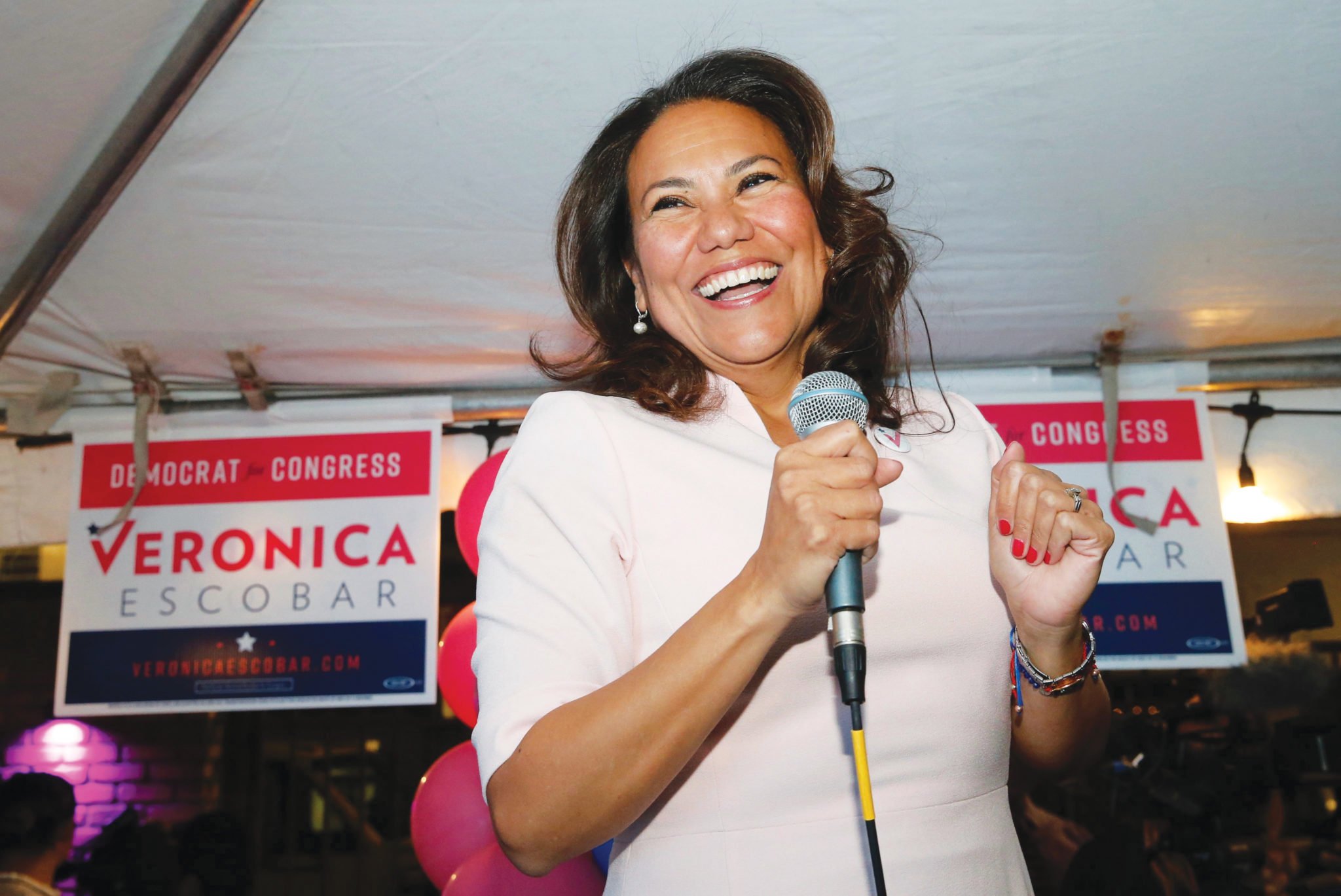
The Interview: Veronica Escobar is Poised to Make History
The Latina would be the first woman to represent Texas' largest border city in Washington, D.C.

A version of this story ran in the June 2018 issue.

While all eyes are on Beto O’Rourke’s bid to unseat Senator Ted Cruz, the race to take over O’Rourke’s El Paso congressional seat has gotten much less attention. Veronica Escobar, the El Paso county judge, decided to step down from her post and run. Positioning herself as a progressive reformer who cleaned up county government corruption, she garnered Beto’s backing as well as support from national Democratic groups. Escobar handily won the primary, which, in this deep-blue district, almost certainly means she’ll win the general. If she does, Escobar will make history as the first woman to represent Texas’ largest border city in Washington, D.C., and, alongside state Senator Sylvia Garcia of Houston, likely the first Latina elected to Congress from Texas. The Observer sat down with the El Paso native to talk about border politics and her plans for D.C.
Q: What prompted you to run?
I actually was going to leave politics. I had served three terms on the commissioners court, so had I finished out my final term, that would have been a dozen years in local government. I really completed what I had set out to do, which was to clean up county government, expand access to health care and create a professional administrator position within the organization. So I felt as though my work was done.
I was thinking about opening up a small business when my friend Beto O’Rourke decided to run for the Senate. I felt like we needed a very strong border voice to replace him, and I just felt the call. I felt very inspired by my fears of what the Trump administration was bringing, alongside my deep love for my community and the border.
You and Sylvia Garcia will likely be the first two Latinas Texas has ever elected to Congress. Why has it taken so long?
It’s very hard for women to run for a congressional office, but it’s even harder for women of color. You have to raise the money necessary to get on TV, to get in the mailboxes, to have a great field campaign. When you don’t have access to a large number of people with deep pockets, it makes fundraising a lot harder.
I was very, very fortunate in that I had a lot of generosity from my community. Thousands and thousands of people gave what they could, and it really bolstered my campaign. Something that’s a little bit different now than before: We had organizations like Latino Victory, Emily’s List and the Congressional Hispanic Caucus’ Bold PAC that stepped up right away and said, “We want to support, we want to help.” And they really gave me a tremendous boost. When I think about women who came before me who didn’t have that kind of support and help, it’s no wonder that it was so difficult for them.
Given the stark polarization on immigration in Congress, is the pathway to comprehensive reform broken?
It’s very broken. Even when the Democrats controlled the House, it was a tough pill for a lot of people to swallow. I think part of it is, even among the most compassionate voters, who also happen to be Democrats, I have heard them say, “We’ve gotta fix our country first” and “At what point does it stop?” Those are absolutely valid, legitimate questions, and it’s an important national conversation that we have to have. We’ve got to have it with facts and realize, what is the benefit to us? There is a benefit to us that immigrants bring, at all levels of the workforce and all skill levels. So when we have that conversation, let’s have it with truth. It’s too easy for even good folks to demonize refugees and migrants when they are struggling or when they’ve lost jobs or when salaries are depressed, and I understand that completely. I’m very sympathetic, but we have to reform the system.
Calls to enhance border security, build a wall and crack down on illegal immigration are not new. Why do you think Trump and Governor Abbott’s words and actions on this front are so pernicious?
Republicans — and some Democrats — use the border and immigration as the boogeyman. They’re going to swoop in, and they’re going to be tough on crime and tough on the border, and we have Republicans in this state and country willing to write blank checks. These are fiscal conservatives, and they’re willing to write blank checks to their leadership and the government as long as it’s pursuing xenophobic goals.
I’m very curious about whether Texas Republicans will tell Governor Abbott, “Hey, now that Trump is sending the National Guard to the border, I guess that we don’t need to continue paying for your border surge, right?” But I bet we continue to pay for that border surge, and so there’s plenty of money for these exercises in vanity so that these guys can look like cowboys. But there’s not enough money for education, there’s not enough money for health care. It’s perplexing to me how their constituents let them get away with it, and they’re not even accountable.
Do you think the Democratic Party needs to move leftward and more aggressively advocate for bold policies like single-payer health care and a $15 minimum wage?
I do, but because I’m a progressive I also believe that a big tent is important. I really do, because I think issues vary from district to district. So I’ll give you an example. On trade, I’m not a lefty. I’m pro-trade. A quarter of the jobs in my district are linked to trade. But when I tell people that, I tell them the story of El Paso, that when NAFTA was passed, we were a garment industry manufacturing town and we put our eggs in that basket.
When NAFTA passed, almost overnight there was double-digit unemployment and we were spiraling into severe economic decline. But the community came together and said we need to diversify our economy, we need to pursue health care, we need to maximize our military installation and jobs that can come with it, but we also need to recognize that trade is here to stay. We became a logistics hub, and now a quarter of our jobs are linked to that. So, you know, I’m not an anti-trade progressive. So there needs to be room for me. But on everything else, I am very deeply aligned with progressive colleagues. We have to be able to have civil discourse about these issues and find areas of unity and common ground where we can without saying, you know, “You’re not really who I need you to be, so there’s the door.”
Beto O’Rourke failed to win a majority of the primary vote in more than half of the state’s 32 border counties. Does he need to do more to ensure that his message resonates with voters?
There’s a tremendous opportunity there for Beto and those who support him, and we’re going to do everything we can to help him. We’re working on this plan to do a Beto border bus tour of key counties in South Texas and on the border to make sure that we rally the troops and make sure that folks understand just how critical this race is and the very powerful role that they can play.
I don’t see his numbers in the primary there as disastrous, as other folks have described it — I don’t think it is at all, in fact. But it does present an opportunity that we’ve got to raise his name ID there.
Each election cycle, there’s the hope that this will be the year that Hispanic voters will turn Texas blue. What’s wrong with that framing, and why do you think Latino turnout continues to be so underwhelming?
We have a lot of working-class families, they’re working multiple jobs, trying to put their kids through college. Their kids are full-time students and working a couple jobs on the side, and people are caught up in what it takes to create a life for themselves. And politics sinks further and further down the priority list.
The other thing is that, frankly, we just believe that somehow Latinos are just going to come to the polls because we’re a growing population. Every group — whether you’re a Latino or female, it doesn’t matter — you need to be inspired, and you need a reason to head to the polls, and being frustrated by Donald Trump is not enough. We need candidates who are willing to inspire people and who will talk about the issues that are important to us.
This interview has been condensed and edited for length and clarity.


